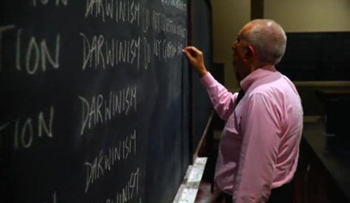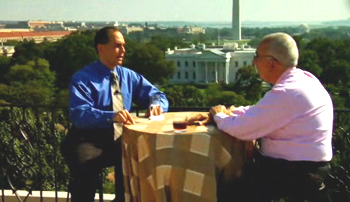by
Andrew Halloway
Photo
<www.expelledthemovie.com>

Last October, in a move that revived memories of
Stalinistic censorship, the Council of Europe voted to encourage member
countries to ban the teaching of creationism as a scientific discipline.
(See When will Europe wake up?). The Council’s
Parliamentary Assembly declared: ‘If we are not careful, creationism
could become a threat to human rights.’ In stark contrast, the reality
on academic campuses around the world is that evolutionary orthodoxy is
already threatening human rights, as a new movie is about to show. This
major feature film, revealing the academic censorship of intelligent
design theory, is to be released in the Northern Hemisphere spring of
2008.
The controversial movie, Expelled: No Intelligence
Allowed, is a documentary that will expose how the Darwinist
hierarchy has closed ranks against the rise of intelligent design, a
theory that opposes evolution and says that a Designer is responsible
for life. Some leading scientists have lost their jobs for expressing
dissident views on the origins of life.
The film shows that in this particular field, science is
far from being a free and open exploration of the truth and is, in
fact, a closed book.
Expelled uncovers the persecution of educators
and scientists who are being denied tenure, and even fired in some
cases, for their belief in the evidence for design in nature,
challenging the idea that life is a result of random chance and
evolution.
The movie is made with the 2008 American elections in
mind, and intelligent design vs evolution has already become an
issue—with candidates taking sides. It is the brainchild of software
developer Walt Ruloff, who has also funded the movie. He made his
fortune by selling his software to Microsoft in the early 1990s. Then he
discovered the intelligent design controversy. He says he was stunned
‘both by the arrogance and brutality of the Darwinist establishment, and
the lack of solid scientific evidence for their views.’
The film has already received endorsements from
high-profile Christian figures like Luis Palau, Charles Colson, Michael
Medved and J.I. Packer. The filmmakers, Premise Media, plan to use viral
marketing to ensure that Expelled reaches students. The
campaign is directed by Motive Entertainment, the company behind the
grass roots promotions for Hollywood blockbusters such as The
Passion of the Christ and The Chronicles of Narnia.
Unlike many documentaries, Expelled doesn’t
just talk to people representing one side of the story. The film
confronts evolutionists such as Richard Dawkins, author of The God
Delusion, influential biologist and atheist blogger PZ Myers, and
Eugenie Scott, head of the anti-creationist lobby group, National Center
for Science Education. The creators of Expelled crossed the
globe over a two-year period, interviewing scores of scientists,
doctors, philosophers and public leaders. The result is a startling
revelation of the way in which freedom of thought and freedom of inquiry
have been expelled from high schools, universities and research
institutions.
Photo <www.expelledthemovie.com>

The star of the film is Hollywood actor Ben Stein, who
is also a lawyer, an economist, a former presidential speechwriter,
author and social commentator. In the film, he discovers biologists,
astronomers, chemists and philosophers who have had their reputations
destroyed and their careers ruined by a scientific establishment that
allows absolutely no dissent from evolution.
For example, Stein meets Richard Sternberg, a double
Ph.D. biologist who allowed a peer-reviewed research paper describing
the evidence for intelligence in the universe to be published in the
scientific journal Proceedings. Not long after publication,
officials from the National Center for Science Education and the
Smithsonian Institution, where Sternberg was a research fellow, began a
coordinated smear and intimidation campaign to get the promising young
scientist expelled from his position. This attack on scientific freedom
was so egregious that it prompted a congressional investigation. See The
Smithsonian/Sternberg controversy.
Stein also meets astrophysicist Guillermo Gonzalez, who
was denied tenure at Iowa State University in spite of his extraordinary
record of achievement. Gonzalez made the mistake of documenting the
design he has observed in the universe. See Darwinian
thought police strike again. There is also Caroline Crocker,
a brilliant biology teacher at George Mason University who was forced
out of the university for briefly discussing problems with Darwinian
theory, and for telling the students that some scientists believe there
is evidence of design in the universe. The list goes on and on.
Scientists are supposed to be allowed to follow the
evidence wherever it may lead, no matter what the implications are.—Ben
Stein, star of Expelled.
‘Big Science in this area of biology has lost its way,’
says Stein. ‘Scientists are supposed to be allowed to follow the
evidence wherever it may lead, no matter what the implications are.
Freedom of inquiry has been greatly compromised, and this is not only
anti-American, it’s anti-science. It’s anti-the whole concept of
learning.’
Walt Ruloff, Co-Executive Producer, says, ‘The
incredible thing about Expelled is that we don’t resort to manipulating
our interviews for the purpose of achieving the “shock effect,”
something that has become common in documentary film these days.
‘Premise Media took on this difficult mission because
we believe the greatest asset of humanity is our freedom to explore and
discover truth.’
Even since the film was made, another case of censorship
in American universities has come to light. In September, Baylor
University took offline the Evolutionary Informatics Laboratory website
that had been administered by Robert Marks, Distinguished Professor of
Electrical and Computer Engineering at Baylor, because the
administration claimed there were anonymous complaints linking the lab
to intelligent design.
This is the third instance in which Baylor University
has restricted free speech and punished a faculty member because of
their views on intelligent design. In 2000, the University
administration caved in to pressure from Darwinian activists demanding
they shut down the Michael Polanyi Research Center, established in part
to do research on intelligent design theory. In 2006, legal scholar
Francis Beckwith was denied tenure by Baylor administrators in part
because of his writings supporting the constitutionality of teaching
intelligent design. The Board of Regents reversed that decision and
Beckwith was granted tenure, but only after a long public battle.
Casey Luskin, a spokesman for Discovery Institute,
America’s leading think tank on intelligent design, says: ‘There is a
troubling pattern of scientists and scholars at Baylor University coming
under attack for questioning evolution. The freedom of scientists,
teachers and students to question Darwin is coming under increasing
attack by people that can only be called Darwinian fundamentalists.
‘What has happened to Professor Marks is censorship, pure and simple.’
(See also US Congressional leader castigated for creation comments.)
Dr Marks has gone the extra mile in trying to
accommodate any legitimate concerns Baylor administrators may have had
about his evolutionary informatics website, even agreeing to put a
disclaimer on the site making clear that it represented his views as a
faculty member, not the university as a whole. But Baylor administrators
have now spurned Marks’ efforts to accommodate them, apparently
reneging on a compromise brokered by Marks’ attorney.
But scientists who support intelligent design shouldn’t
be surprised at their predicament. Before the particular subset of
anti-Darwinism known as ‘intelligent design’ arrived on the scene,
creationist scientists had been systematically persecuted for decades,
and still are today. For example, when Dr Marcus Ross, a young
palaeontologist at the University of Rhode Island, submitted his
doctoral thesis on mosasaurs—giant extinct marine reptiles—he was
‘outed’ as a young-Earth creationist. The revelation, in The New
York Times, sparked an impassioned debate about whether his views
should preclude him from his chosen profession. (Dr Ross was interviewed
in CMI’s Creation magazine in December 2007.)
The fact that he is a brilliant scientist, whose
research is described by colleagues as impeccable, seemed irrelevant to
the orthodox Darwinists, who called for him to be sacked simply because
he expresses different scientific views to theirs.
Eugenie Scott, executive director of the US National
Centre for Science Education, favoured a hard line against Dr Ross
because of the suspicion that he would use his doctorate ‘to miseducate
the public’.
Is academic censorship also taking place in the UK? If
anything, it’s probably worse on Darwin’s home patch. Mark Pickering,
head of student ministries at the Christian Medical Fellowship, says
that there is systematic bias in the scientific world against
intelligent design: ‘I have academic colleagues who do not yet have
tenure who cannot own up to their professors that they have sympathy
with intelligent design because that would be the end of their career.
This is despite them already proving themselves as good scientists’ (Student
British Medical Journal, June 07).
In December 2006, The Guardian reported that an
influential group of academics were demanding a change in the law to
ensure UK scholars are given complete freedom of speech in universities.
More than 60 educators from Academics for Academic Freedom called for
laws to be extended to ensure that academics are free to ‘question and
test received wisdom, and to put forward unpopular opinions’.
In today’s political climate it is harder than ever for
academics to defend open debate.—Academics for Academic Freedom
A statement on the AFAF website says:
‘In today’s political climate it is harder than ever
for academics to defend open debate. Restrictive legislation, and the
bureaucratic rules and regulations of government quangos and of
universities themselves, have undermined academic freedom.
‘Many academics are fearful of upsetting managers and
politicians by expressing controversial opinions. Afraid to challenge
mainstream thought, many pursue self-censorship.’
The very fact that such a campaign is necessary seems to
prove that free debate and research in the UK are under threat. Richard
Dawkins has publicly called for Andy
McIntosh, Professor of Thermodynamics at Leeds to be sacked
simply for claiming evolutionary theory is wrong. (Note: the title
‘professor’ is given only to the highest academic rank at UK and British
Commonwealth universities, unlike in American universities.)
Howard Taylor, chaplain at Heriot–Watt University in
Edinburgh, says: ‘At Caltech University in Los Angeles, a lecturer has
complained that the scientific hierarchy is behaving like the “mother
church” of the Middle Ages and intimidating those of a different view.’
While the lecturer was talking about scientific dissent
on global warming, it appears that the comparison is just as applicable
to evolution. It seems the scientific establishment has nullified the
Royal Society’s motto: ‘Nullius in verba’1 , which refers to open,
unprejudiced, uninhibited inquiry and unstifled debate.
Two Christian Responses: The Glory of Martyrdom and
Apologetics
"Though beheaded, and
crucified, and thrown to wild beasts, and chains, and fire, and all
other kinds of torture, we do not give up our confession; but, the more
such things happen, the more do others in larger numbers become
faithful."
-- Justin Martyr
In the face of
persecution, many Christians chose to die before they would deny their
Lord. Those who did so came to be called martyrs, which
means "witnesses." The second-century theologian Tertullian had
converted to Christianity based in part on his wonder at Christians'
faithfulness in the face of martyrdom and it clearly had a similar
effect on others as well. It was Tertullian who famously declared, "The
blood of the martyrs is the seed of the church." Indeed, persecution
seemed to have a dramatic effect on Christianity's numbers, but not in
the direction intended by the persecutors.
A second
response of the church to Roman persecution was to write apologies,
or defenses, of the Christian faith. The bishops and leaders who wrote
these defenses are known as the Apologists. Writing especially in the
2nd century AD, the Apologists' primary goal was to defend Christianity
against pagan accusations and misconceptions in an effort to stop the
persecution. Thus they often addressed their works to Roman emperors.
The Apologists explained, for example, that the Christian "love feast"
did not involve cannibalism or orgies as many thought, but was a sacred
meal of bread and wine in honor of Christ's death.
The Apologists also sought to show that Christianity was equal
or even superior to pagan religion and philosophy, and good for the
Roman state. They pointed out that Christianity was just as old as Greek
thought, having originated in the ancient religion of the Hebrews. They
asked their readers to compare the ethical behavior of Christians and
pagans. They explained that although they were not willing to sacrifice
to him as a god, Christians prayed for the emperor's welfare regularly.
The
Apologists' writings do not provide a full picture of Christianity in
the 2nd century, as they were generally limited in their scope to
responding to specific accusations. However,
these early texts provide important insight into how early Christians
related their faith to Greco-Roman paganism and why they personally
found it convincing. So while we are
inevitably facing a greater degree of persecution in the USA via
atheism/naturalism/neo-Darwinism/humanism, it
is ever important for us to be equally prepared at this level, as our
Brothers & Sisters in communist and Islamic regimes, who are dying
for their faith before they will deny Christ.

Please click to Play